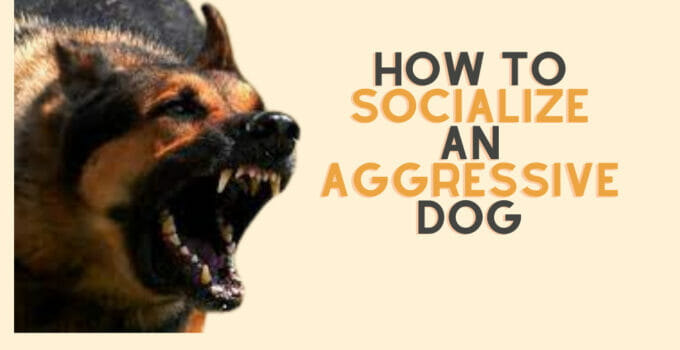If your dog become aggressive with other dogs, it’s essential to socialize them as early and often as possible. This can help teach them how to behave appropriately around other animals. Additionally, it’s crucial that you are always prepared for an altercation by having proper management tools in places, such as a muzzle or leash. With passage of time and patience, you can help your aggressive dog learn to get along with others.
By following these simple tips, you can help socialize your aggressive dog and get them on the road to being a well-mannered pup.
How to Socialize Your Aggressive Dog-Top Tips
Introduce your dog to others:
Best ways to socialize your aggressive dog is to introduce them to other dogs. This can be done in a controlled setting, such as a park or dog run, where plenty of people and animals are around. Be sure to keep a close eye on your pup and intervene if they become agitated.
Teach them basic commands:
In addition to socialization, it’s essential to teach your basic dog commands. This will help them understand that you are in charge and will also make it easier to control them in public settings. Some basic commands include sit, stay, come, and down.
Be consistent with rules:
It’s essential to be consistent with the rules you set for your dog. If you allow them to jump up on people one day but not the next, they will become confused and may start to act out. Please make sure you are strict with your rules and enforce them at all times.
Have patience:
It may take time for your aggressive dog to change its behavior. Be patient and steady with your training, and be sure to give them plenty of positive reinforcement when they do well. With patience and time, you can help your pup become a well-mannered member of the family.
Take your furry friend to growl classes:
If your dog’s aggression is accompanied by dominant behavior, you may want to consider enrolling them in growl classes. These classes help teach dogs how to behave appropriately around other animals and can be extremely helpful in socializing aggressive dogs.
Encouraging your dog to participate in social activities, such as going for walks or playing at the park, can help them learn how to behave around other people and animals. Be sure to go to places with plenty of distractions and people around, so your pup can get used to being in a busy environment.
Get professional help:
If you’re struggling to socialize your aggressive dog on your own, it may be helpful to seek professional help. A dog trainer or behaviorist can help you develop a specific plan tailored to your pup’s needs and provide you with the tools you need to train them successfully.
With a little work hard, you can help turn your aggressive dog into a well-mannered pup. By following these simple tips, you can socialize them effectively and get them on the road to being polite family members.
What does “Socializing A Dog” Mean?
Socialization is one of the most important aspects of raising a dog. Puppies need to be around lots of different people, animals, and environments so that they can learn how to behave appropriately in various situations. Without proper socialization, dogs can become fearful or aggressive.
Why Should You Get Your Dog Socialized?
Dogs are social animals and need to cooperate with their pack (human family) and other dogs. A lack of socialization can cause dogs to become aggressive, fearful, or shy.
Well-socialized dogs are more likely to be well-adjusted pets and better behaved. They will also be more likely to find a home if they need to be re-homed.
When Should Your Dog Be Socialized?
Dogs are social animals and should be interacted with regularly. The amount of interaction will depend on the dog’s age, breed, and personality.
Puppies should be socialized as early as possible, while adult dogs can still benefit from regular interaction.
What Causes Dog On Dog Aggression?
When it comes to dog-on-dog aggression, there can be various reasons why it happens. Some basic common causes include fear, territoriality, and dominance.
In some cases, it might also be due to a lack of socialization or poor handling by the owner. If you’re ever unsure about the cause of your dog’s aggression, it’s best to consult with a professional trainer or behaviorist.
What Causes Aggression In Dogs?
Many factors can contribute to aggression in dogs. Some of the most common causes include fear, territoriality, and frustration. In some cases, genetics may also play a role in causing aggression.
If your dog is aggressive, it is essential to seek professional help from a qualified trainer or behaviorist to help you address the problem.
Aggressive Factors in Dogs?
Many factors can contribute to an aggressive dog. These factors may include fear, pain, owner behavior, breed genetics, and socialization.
Fear is probably the most common reason why dogs become aggressive. Dogs may become aggressive when they are afraid of something or someone. Due to a traumatic event in their past, or simply because they are not around new people or animals.
Pain is another common factor that can lead to aggression in dogs. If a dog is in pain, he may lash out at anyone or anything that comes near him to protect himself.
Owner behavior can also lead to aggressive behavior in dogs. If a dog is not adequately trained and is constantly being yelled at or hit, he may become aggressive to protect himself.
Genetics can also play a role in canine aggression. Some breeds are naturally more aggressive than others.
Socialization is another important factor when it comes to canine aggression. Dogs who are not adequately socialized may become fearful or aggressive when encountering new people or animals.
If you are worried that your dog may be aggressive, it is essential to seek help from a professional. There are many reasons why dogs may become aggressive, and it is crucial to identify the root cause of the problem to effectively treat it.
Does Age Make A Difference?
One of the most common questions people have about canine aggression is whether age makes a difference. It is safe to say that puppies are more likely to be aggressive than adult dogs, but there are always exceptions to this rule.
Puppies may be more aggressive due to their inexperience with the world around them, while adult dogs may be more aggressive due to fear or pain.
How NOT To Socialize An Aggressive Dog?
Now that you know how to socialize your dog, it is crucial to understand how not to socialize him. There are a few things you should avoid when trying to help your dog become more social.
- First and foremost, do not overdo it. When you first start to socialize with your dog, take things slowly. You don’t want to overwhelm him and make him fearful or aggressive. Start with short sessions and gradually increase the time as your dog becomes more comfortable.
- Avoid putting your dog in situations where he is uncomfortable. If he doesn’t like other dogs, don’t take him to a park full of them. Don’t take him to a busy street corner if he’s afraid of people. Instead, find comfortable places and situations for him and stick with those until he’s more comfortable with new things.
- Don’t use harsh punishment or reinforcement when socializing with your dog. This can have the opposite effect and make him fearful or aggressive. Reward your friend for good behavior and ignore him when he exhibits terrible behavior. This will help him learn that the behavior you want is the one that gets rewarded.
Encouragement And Reward Training
The use of rewards and encouragement is one of the most successful tools in training an aggressive dog. When used correctly, it can help your dog understand that good behavior is what is expected of him. The key is to be consistent with your rewards and to provide positive reinforcement whenever your dog behaves in a way that you want him to.
There are a variety of rewards you can use when training an aggressive dog. Some people prefer to use treats, while others prefer to pat their dog on the head or verbal praise.
The most important thing is to be consistent with your rewards and provide them immediately after your dog exhibits the desired behavior. This will help him associate the good behavior with the reward and encourage him to continue displaying that behavior.
It is also essential to remember that punishment should never be used when training an aggressive dog. This can have the opposite effect and may cause your dog to become more aggressive. Instead, focus on rewarding your dog for good behavior and ignoring him when he displays lousy behavior. This will help him to learn that the behavior you want is the one that gets rewarded.
Conclusion
The key to training an aggressive dog is patience and consistency. You will need to be patient while your dog learns new behaviors, and you will need to be consistent with the rewards you offer him. With passage of time and patience, you can help your dog become a more socialized member of society.


